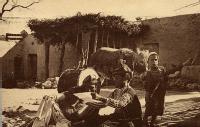Analysis
Baqaya Suwar is written from the perspective of the grown up narrator who attempts to recuperate his childhood through series of fragmented mental images, drawn from the oral world of poor peasants in Syria at the beginning of the twentieth century, including the stories his mother told him, the tales his father recounted and his own recollections of the past.
Critical interest in Mina’s novel, especially by Arab critics, emphasises either the autobiographical elements in it or the novel’s critique of the erosion of the silk industry by the advent of synthetic silk from China. Readings of this novel as a piece of nostalgic autobiography written by a mature and successful author do not offer much insight into the complicated politics of this text. Autobiographical readings of this novel have mostly focused on the rags to riches story of Mina’s life which, in my opinion, fails to capture the reality of his life. For although it is true that Hanna Mina’s life, “parallels in its rhythm and details his aesthetic performance” (Khaldoon Shamaa) yet criticism which has focussed solely on checking facts and confirming the hardship experienced by silk farmers in the 1920s has failed to offer insights into the complex layers of meaning embedded in this narrative. Similarly, critics who have read this novel as a historiographic narrative, focussing on a particular moment in Syria’s economic decline after WWI, have done this in a rather cautious, superficial, at times even subdued way.
I wish to address the deeper, more controversial levels that this novel reaches and by doing so, I hope to establish this text as one of a handful of novels that fulfilled the mission of the Arab Writers Association by critiquing vehemently particular established traditions, by highlighting and mocking the government’s lack of control over the population and by predicting a bleak future to a country which presents itself as a socialist republic, with a strong underground communist movement, but which fails to take into account those strata of society that socialism is concerned with.
There are different facets to this argument but here I will focus only on 2 key characters: The Mukhtar and the Uncle. The relationship of the Mukhtar and the Father is a typical master-servant hierarchy. The father is poor, the Mukhtar rich, hence the Mukhtar is powerful and in control. The Mukhtar is not only the landlord he is also the mayor representing the government in the village of Suwaidiya. Mina depicts the Mukhtar as a flat character with no redeeming features. Drawn from the perspective of the young boy who saw his family being persecuted by the landlord and who witnessed his mother’s physical abuse by him, the Mukhtar is monstrous, greedy and oppressive. The father refuses to abide by the rules of the Feudal system which dictate that if the farm-hand works hard and delivers the crop to the Mukhtar--who owns the land, its food and the people living on it--then the fellah would be looked after, his family fed and protected. When the Father decides to rebel against an unjust system he sets himself in direct conflict with the dominant hierarchy. As readers, we cannot but be moved by his rhetoric which is eloquent and compelling.
The father's Romantic discourse rivals the realism of the child. He is an ambitious man who refuses to demean himself and his family and who asks for no more than his fair share of the crop. So when the Father rebels, readers are inclined to support him. We cheer him on as he manages to convince the other fellahin to resist exploitation. But the Father is depicted like a tragic hero, his flaw is Hubris. And this hubris leads to his downfall, to the enslavement of his youngest daughter and the ruin of the family. The Father rebels twice in this narrative. Twice he attempts to resist the landlord and assert his right to live and work independently. Twice he is crushed, humiliated, ruined.
Mina’s narrative is unforgiving in its representation of corrupt government officials and in its depiction of the plight of the disempowered.The Father is unable to plead his case to a higher authority because he is illiterate, he lives far from the city, a Christian in a predominantly Muslim countryside, and because the lawmaker and judge is his nemesis. In his second attempt at rebelling, the father meets a general in the army who happens to be his cousin. This cousin helps the family stand up to the landlord but he turns out to be a rapist who violates Zannouba, the Father’s mistress. Here too Hubris overcomes the Father and he risks his family’s welfare to fight the general. The result is further hardship, exile and poverty. The isolation and destitution of the family at the heart of this novel reflects the state of the nation in the years 1918-1975.
In the years 1918-1975 Syria underwent a series of political changes which had consequences on the population’s sense of identity, which tested their allegiance and their endurance. These changes are best illustrated by the various flags which were adopted during these turbulent 57 years (Link to Flags)
Hanna Mina is writing this novel in 1975 and he is looking back at the history of his country. When he writes the ending he knows what the future ahead of the family looks like, and so do his readers. He sets it at a crucial time in Syrian history when the promise of a pan-Arab state has just evaporated. The King flees the country upon its invasion by the French; he flees in humiliation, never to be seen again, leaving the country at the mercy of heaven. It is possible to read the loss of the King, a father-figure for the nation, as an immediate cause for the loss of a sense of national identity.
Mina’s novel provocatively suggests that the loss of a guiding masculine figure—as is evident in the representation of the often-absent, picaro-like father—causes the deterioration of the traditional national/familial set up. Just like the victorious Emir who defeats the Ottomans and promises to lead the country into independence, the father promises to rebel against the traditional feudal system. Both leaders fail. Both are exiled. The novel reflects on years political turmoil during which Syria and the rest of the Arab world craved leadership. Successive governments, mostly foreign or puppet governments robbed the country of any sense of national unity and created a wider gap between rich and poor, powerful and powerless and created sectarian tension among the citizens.
The French mandate imposed new ways of life which did not coincide with the local traditions. French rule was oppressive: The franc became the base of the economy, and currency management was in the hands of French bankers concerned with French, rather than Syrian, shareholders and interests. The French language became compulsory in schools, and pupils were required to sing the "Marseillaise." Colonial administrators attempted to apply techniques of administration learned in North Africa to the Arabs of Syria. Nearly every feature of Syrian life came under French control.
And of course the problem here is that many Syrian leaders were complicit in this oppression; and Mina’s text represents this complicity in the figure of the father (adding another level of complexity to this character): The novel’s opening line “They were taking my sick father out on a stretcher” sets the mood for this narrative which is dominated by the absence of the father either through travel or through illness. The sight of the disappearing father, and the “weeping mother who as following him” is engraved in the narrator’s childhood mind and its recollection triggers particular memories all of which revolve around the same sentiment of abandonment and loss which haunts the narrator’s childhood. The absence of the father opens the field for the family’s abuse and exploitation and causes them to starve and lose their dignity.
The narrator recalls a moving scene he witnessed between his parents: I heard Mother scolding Father when she was fed up with him; I saw her pushing his hand away from her saying: “If you were a father like other fathers we wouldn’t have to put up with the Mukhtar’s abuse nor would you be content to have your daughter working as a servant for people. I assumed that you would be angry and wouldn’t sleep before going to bring her back.” Not only did he fail to get her, he did not even go to see her. It was neither a matter of urgency nor desire within him. My sister’s work as a servant for others was a door that had been opened for him and remained open. (56) At this point, the father himself is prepared to take part in the exploitation of his daughter because he sees her servitude as a possible source of income for the family. The father’s ineptitude to earn a living is compensated for by the daughter’s sacrifice. This is a scary prospect for the family. If the father is unable to protect the family and takes part in their exploitation, where can the Mother turn for safety?
Well, the Mother resorts to a distant uncle to help her. This uncle is a highway robber who has developed a reputation for being strong but fair. He leads a quiet, understated existence and is always prepared to help the needy. The uncle is a marginal figure in the novel and occupies a marginal position in society (He lives by the Law of Retribution). Twice the Mother goes to him for help and twice he rescues the family from ruin. The uncle succeeds in scaring the Mukhtar into releasing the daughter who had been kept as ransom; he also succeeds in negotiating the Mother’s claim to a small inheritance. The uncle’s character represents a model of primitive masculinity drawn from old fashioned Arabic folktales. He understands the rules and codes of the feudal system and is able to impose his word on the Mukhtar (his strategy is described on p25). Yet the novel is clear in its depiction of the uncle as a marginalised figure (his existence is non-normative). He is unique and his way of life is dying out.
All the models of masculinity in the novel are represented as either obsolete or unviable. The Mukhtar’s position is threatened by the collapse of the silk industry and by the advent of the French army who take over the countryside. The army general is exposed as a tyrant and rapist and his powerful position is seen as a façade for moral corruption. The father is a romantic idealist, who fails to protect his family and whose tragic flaw causes the demise of all those around him. So the final image of the family all packed up and ready to move yet again is a clear indication that they have been failed by a system which lacks any sense of order or leadership. Every single version of masculinity is undermined and exposed as outmoded, ineffective and obsolete. What lies ahead of this family? well, in 1975 Mina knew that there would be another 57 years of turmoil before another military coup would install Assad as absolute dictator…
To cite this page:
Jenainati, Cathia. "Analysis", Hanna Mina's Fragments of Memory. The Warwick Database of Arabic Resources.
In brief
Fragments of Memory was published in 1975 and looks back at Syria Post-WWI. I propose to argue that the representation of the father figure in this novel expresses significant concerns with the changing political landscape of Syria in the years following the end of Ottoman rule in 1918. The novel is set in the 1920s and engages with the consequences of the newly established French mandate on the poorest classes of society, the fellahin, whose lives were shaped by a feudal social set up that allowed them no access to justice, no legal representation and no opportunities for participating in economic wealth. The representation of the father figure in this novel, as I will show, exposes the cultural threats to masculinity and explicitly invites readers to engage in the questioning of hierarchical social strata that marginalise and mock traditional views of masculinity.
Silkworms Feeding on Mulberry leaves
Silk
Latakia 1920s




